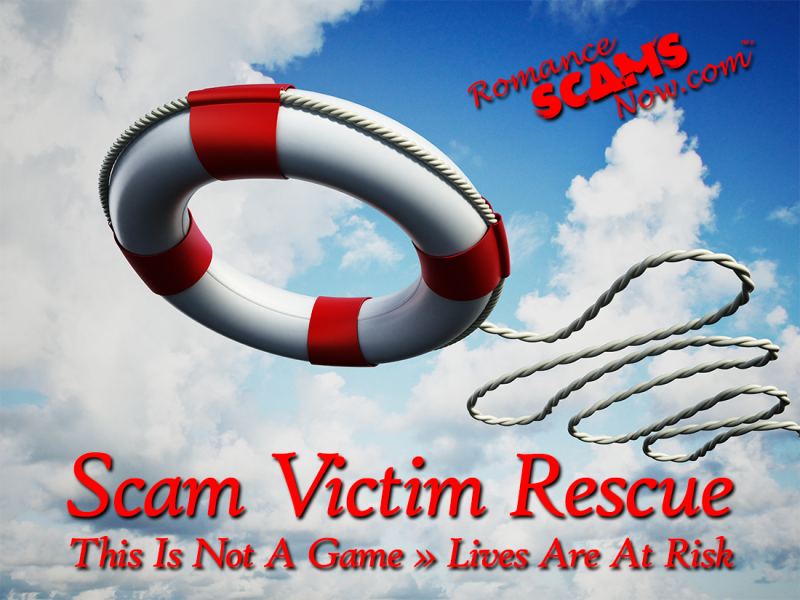Rescuing Victims From Scammers
Let’s talk about rescuing victims
This applies mostly to Facebook and other Social Media.
When you find a scammer, there are people there – they are commenting, and maybe have the scammer as a friend. Clearly they believe the scammer is a real person.
These are the Prospects & Victims.
What can we do to save these people?
This is a very delicate moment.
You all know that scammers are real. But it is like telling your parents about the ghost in the closet when you were a child.
Not everyone is ready to listen.
As a responsible person, you want to tell them that they are making a giant mistake with this person (the scammer). This person is fake, a scammer, and dangerous, But why should they listen to you? Remember all the boyfriends or girlfriends that your parents didn’t like when you were younger?
Did you listen?
When a stranger walks up to you on the street and says you are talking to a monster, what would your reaction be? They are going to think you are crazy, or worse that you are dangerous. Maybe they will think you are jealous and want the person for yourself?
They may report you to Facebook.
When we rescue potential victims, there is a process that we have found that works. But it only works about half of the time.
You have to understand that you will be wasting a lot of your time on people that don’t believe you. But we do it for the ones that will believe you!
This is the Rescue Process:
What you do with them is tell them once and ONLY ONCE!
If you know who the scammer is and they are obvious or published someplace then show the person the post about the scammer.
Always make sure the scammer is reported on www.Anyscam.com first. That way you can point them to the listings on Anyscam.com as your proof. Or you can point them to any other anti-scam social media page or website, just as long as it is clear that the photo is displayed. The best would be to report them on the Anyscam.com Cobalt Alerts page so the world is alerted as well.
You have to show them something to have a chance that they will believe you.
Now it is up to them to accept it or continue in denial.
Because the more you try to convince them, the more they will react and start to blame you – they will transfer their anger onto you.
What you say is just as important. So think about the problem of the stranger on the street. You see a couple and you walk up to the girl while the guy is away and just say “he is a murderer”, the girl won’t listen.
So what we say is something like this:
“We are investigating this profile, he/she is a reported scammer. We saw you are connected to this profile and wanted to pass this information to you. You can see that he has been reported and posted here [webpage address]. This must come as a shock, so if we can help, please let me know. We offer support groups for scam victims when you are ready. If you want to talk about it let me know?”
Say nothing more at that point, unless THEY want to talk.
You let the person make up their own mind, and you have offered help if they need it.
Just remember, you cannot convince someone of something they do not want to believe. That is why you deliver the message and walk away. You don’t argue. You don’t explain it. You let them come to an understanding and realization that they were scammed. They have to do that part on their own.
But you planted a seed, now let it grow.
Some may come back and thank you for saving them. Some will be too embarrassed to talk afterward. Some will continue to deny it until they lose everything,
All we can do is tell the truth, and extend a helping hand if they want it. Anything more and we can do more damage.
In fact, if you try to force the issue, they may eventually accept it, but will be so turned off from seeking support that they will never get it, making recovery a much longer proposition.
The rules of Victim Rescue are:
- Report & Post The Scammer – Or Find Proof – You Need To Show Them Something!
- Initial Contact – Deliver The Message
- Back Off Completely – Let Them Make The Next Move
Do not contact their friends or family to help them. Leave them alone to accept the idea. We are not stalkers.
If you want, you can do two things: monitor their profile (without sending a friend request, unless they offer that) to see if they are in danger – such as posting about suicide. If you see that then discuss it with us, or report their profile to Facebook – they are good about interventions now. BUT don’t call their local police. Can you imagine how much damage you could do if you pick up on the wrong signals? If they are the right signals then yes, that is exactly what should be done,
You can also follow up with them after a few days (between 4 and 7 days) and just say you wanted to see if they were ok. Offer the support group option again.
A rational person will accept help. Otherwise, we can’t help them because they are not ready.
If they are on Facebook, you can suggest that they join one of our Scam Victims’ Supoprt Groups too!
Send us an email if you have questions? info@RomanceScamsNow.com





Name jamesmirgan9008@gmail.com He is on the hangouts app. Been talking to him everyday fir 7mos.Have sent him money and wants more.States he is on oil rig in Gulf of Mexico near coast of Alabama. He states he wants to come marry me and live here. He staes he is Mexican and has a daughter in Uk. Stated his wife died in motor accident. Very soft spoken. Can be irrrated if you do not do what he asks. Would like to kniw if he is really on a ship or where he is acutally texting from. The actual location. We use the hangouts app to text daily.